First as a baseline, the timings of the existing approaches
on my machine:
Original program posted in the question:
time stack exec primorig
95673602693282040
real 0m4.601s
user 0m4.387s
sys 0m0.251s
Second the version using Data.IntMap.Strict from
here
time stack exec primIntMapStrict
95673602693282040
real 0m2.775s
user 0m2.753s
sys 0m0.052s
Shershs code with Data.Judy dropped in here
time stack exec prim-hash2
95673602693282040
real 0m0.945s
user 0m0.955s
sys 0m0.028s
Your python solution.
I compiled it with
python -O -m py_compile problem10.py
and the timing:
time python __pycache__/problem10.cpython-36.opt-1.pyc
95673602693282040
real 0m1.163s
user 0m1.160s
sys 0m0.003s
Your C++ version:
$ g++ -O2 --std=c++11 p10.cpp -o p10
$ time ./p10
sum(2000000000) = 95673602693282040
real 0m0.314s
user 0m0.310s
sys 0m0.003s
I didn't bother to provide a baseline for slow.hs, as I didn't
want to wait for it to complete when run with an argument of
2*10^9.
Subsecond performance
The following program runs in under a second on my machine.
It uses a hand rolled hashmap, which uses closed hashing with
linear probing and uses some variant of knuths hashfunction,
see here.
Certainly it is somewhat tailored to the case, as the lookup
function for example expects the searched keys to be present.
Timings:
time stack exec prim
95673602693282040
real 0m0.725s
user 0m0.714s
sys 0m0.047s
First I implemented my hand rolled hashmap simply to hash
the keys with
key `mod` size
and selected a size multiple times higher than the expected
input, but the program took 22s or more to complete.
Finally it was a matter of choosing a hash function which was
good for the workload.
Here is the program:
import Data.Maybe
import Control.Monad
import Data.Array.IO
import Data.Array.Base (unsafeRead)
type Number = Int
data Map = Map { keys :: IOUArray Int Number
, values :: IOUArray Int Number
, size :: !Int
, factor :: !Int
}
newMap :: Int -> Int -> IO Map
newMap s f = do
k <- newArray (0, s-1) 0
v <- newArray (0, s-1) 0
return $ Map k v s f
storeKey :: IOUArray Int Number -> Int -> Int -> Number -> IO Int
storeKey arr s f key = go ((key * f) `mod` s)
where
go :: Int -> IO Int
go ind = do
v <- readArray arr ind
go2 v ind
go2 v ind
| v == 0 = do { writeArray arr ind key; return ind; }
| v == key = return ind
| otherwise = go ((ind + 1) `mod` s)
loadKey :: IOUArray Int Number -> Int -> Int -> Number -> IO Int
loadKey arr s f key = s `seq` key `seq` go ((key *f) `mod` s)
where
go :: Int -> IO Int
go ix = do
v <- unsafeRead arr ix
if v == key then return ix else go ((ix + 1) `mod` s)
insertIntoMap :: Map -> (Number, Number) -> IO Map
insertIntoMap m@(Map ks vs s f) (k, v) = do
ix <- storeKey ks s f k
writeArray vs ix v
return m
fromList :: Int -> Int -> [(Number, Number)] -> IO Map
fromList s f xs = do
m <- newMap s f
foldM insertIntoMap m xs
(!) :: Map -> Number -> IO Number
(!) (Map ks vs s f) k = do
ix <- loadKey ks s f k
readArray vs ix
mupdate :: Map -> Number -> (Number -> Number) -> IO ()
mupdate (Map ks vs s fac) i f = do
ix <- loadKey ks s fac i
old <- readArray vs ix
let x' = f old
x' `seq` writeArray vs ix x'
r' :: Number -> Number
r' = floor . sqrt . fromIntegral
vs' :: Integral a => a -> a -> [a]
vs' n r = [n `div` i | i <- [1..r]] ++ reverse [1..n `div` r - 1]
vss' n r = r + n `div` r -1
list' :: Int -> Int -> [Number] -> IO Map
list' s f vs = fromList s f [(i, i * (i + 1) `div` 2 - 1) | i <- vs]
problem10 :: Number -> IO Number
problem10 n = do
m <- list' (19*vss) (19*vss+7) vs
nm <- sieve m 2 r vs
nm ! n
where vs = vs' n r
vss = vss' n r
r = r' n
sieve :: Map -> Number -> Number -> [Number] -> IO Map
sieve m p r vs | p > r = return m
| otherwise = do
v1 <- m ! p
v2 <- m ! (p - 1)
nm <- if v1 > v2 then update m vs p else return m
sieve nm (p + 1) r vs
update :: Map -> [Number] -> Number -> IO Map
update m vs p = foldM (decrease p) m $ takeWhile (>= p*p) vs
decrease :: Number -> Map -> Number -> IO Map
decrease p m k = do
v <- sumOfSieved m k p
mupdate m k (subtract v)
return m
sumOfSieved :: Map -> Number -> Number -> IO Number
sumOfSieved m v p = do
v1 <- m ! (v `div` p)
v2 <- m ! (p - 1)
return $ p * (v1 - v2)
main = do { n <- problem10 (2*10^9) ; print n; } -- 2*10^9
I am not a professional with hashing and that sort of stuff, so
this can certainly be improved a lot. Maybe we Haskellers should
improve the of the shelf hash maps or provide some simpler ones.
My hashmap, Shershs code
If I plug my hashmap in Shershs (see answer below) code, see here
we are even down to
time stack exec prim-hash2
95673602693282040
real 0m0.601s
user 0m0.604s
sys 0m0.034s
Why is slow.hs slow?
If you read through the source
for the function insert in Data.HashTable.ST.Basic, you
will see that it deletes the old key value pair and inserts
a new one. It doesn't look up the "place" for the value and
mutate it, as one might imagine, if one reads that it is
a "mutable" hashtable. Here the hashtable itself is mutable,
so you don't need to copy the whole hashtable for insertion
of a new key value pair, but the value places for the pairs
are not. I don't know if that is the whole story of slow.hs
being slow, but my guess is, it is a pretty big part of it.
A few minor improvements
So that's the idea I followed while trying to improve
your program the first time.
See, you don't need a mutable mapping from keys to values.
Your key set is fixed. You want a mapping from keys to mutable
places. (Which is, by the way, what you get from C++ by default.)
And so I tried to come up with that. I used IntMap IORef from
Data.IntMap.Strict and Data.IORef first and got a timing
of
tack exec prim
95673602693282040
real 0m2.134s
user 0m2.141s
sys 0m0.028s
I thought maybe it would help to work with unboxed values
and to get that, I used IOUArray Int Int with 1 element
each instead of IORef and got those timings:
time stack exec prim
95673602693282040
real 0m2.015s
user 0m2.018s
sys 0m0.038s
Not much of a difference and so I tried to get rid of bounds
checking in the 1 element arrays by using unsafeRead and
unsafeWrite and got a timing of
time stack exec prim
95673602693282040
real 0m1.845s
user 0m1.850s
sys 0m0.030s
which was the best I got using Data.IntMap.Strict.
Of course I ran each program multiple times to see if
the times are stable and the differences in run time aren't
just noise.
It looks like these are all just micro-optimizations.
And here is the program that ran fastest for me without using a hand rolled data structure:
import qualified Data.IntMap.Strict as M
import Control.Monad
import Data.Array.IO
import Data.Array.Base (unsafeRead, unsafeWrite)
type Number = Int
type Place = IOUArray Number Number
type Map = M.IntMap Place
tupleToRef :: (Number, Number) -> IO (Number, Place)
tupleToRef = traverse (newArray (0,0))
insertRefs :: [(Number, Number)] -> IO [(Number, Place)]
insertRefs = traverse tupleToRef
fromList :: [(Number, Number)] -> IO Map
fromList xs = M.fromList <$> insertRefs xs
(!) :: Map -> Number -> IO Number
(!) m i = unsafeRead (m M.! i) 0
mupdate :: Map -> Number -> (Number -> Number) -> IO ()
mupdate m i f = do
let place = m M.! i
old <- unsafeRead place 0
let x' = f old
-- make the application of f strict
x' `seq` unsafeWrite place 0 x'
r' :: Number -> Number
r' = floor . sqrt . fromIntegral
vs' :: Integral a => a -> a -> [a]
vs' n r = [n `div` i | i <- [1..r]] ++ reverse [1..n `div` r - 1]
list' :: [Number] -> IO Map
list' vs = fromList [(i, i * (i + 1) `div` 2 - 1) | i <- vs]
problem10 :: Number -> IO Number
problem10 n = do
m <- list' vs
nm <- sieve m 2 r vs
nm ! n
where vs = vs' n r
r = r' n
sieve :: Map -> Number -> Number -> [Number] -> IO Map
sieve m p r vs | p > r = return m
| otherwise = do
v1 <- m ! p
v2 <- m ! (p - 1)
nm <- if v1 > v2 then update m vs p else return m
sieve nm (p + 1) r vs
update :: Map -> [Number] -> Number -> IO Map
update m vs p = foldM (decrease p) m $ takeWhile (>= p*p) vs
decrease :: Number -> Map -> Number -> IO Map
decrease p m k = do
v <- sumOfSieved m k p
mupdate m k (subtract v)
return m
sumOfSieved :: Map -> Number -> Number -> IO Number
sumOfSieved m v p = do
v1 <- m ! (v `div` p)
v2 <- m ! (p - 1)
return $ p * (v1 - v2)
main = do { n <- problem10 (2*10^9) ; print n; } -- 2*10^9
If you profile that, you see that it spends most of the time in the custom lookup function (!),
don't know how to improve that further. Trying to inline (!) with {-# INLINE (!) #-}
didn't yield better results; maybe ghc already did this.



